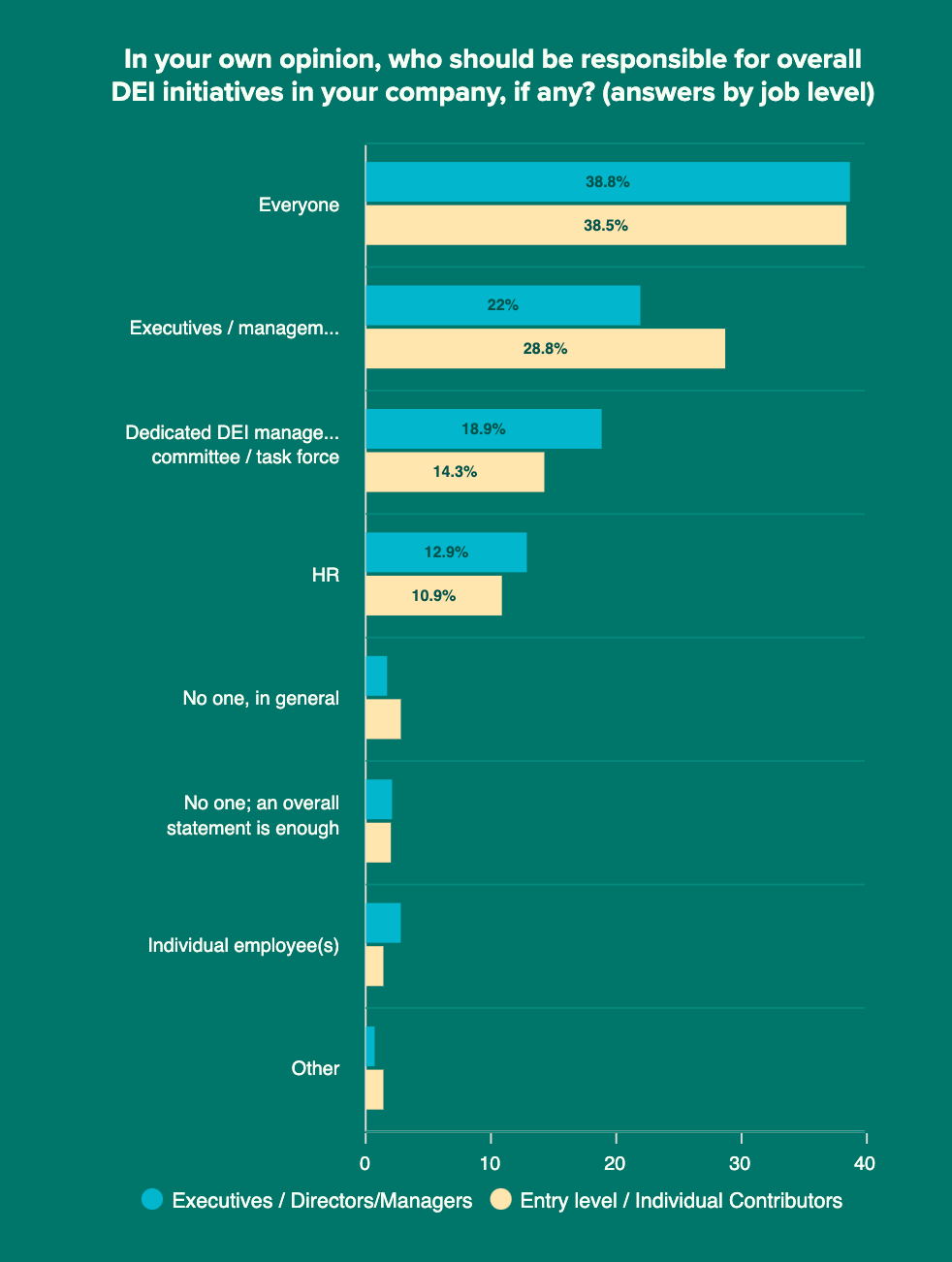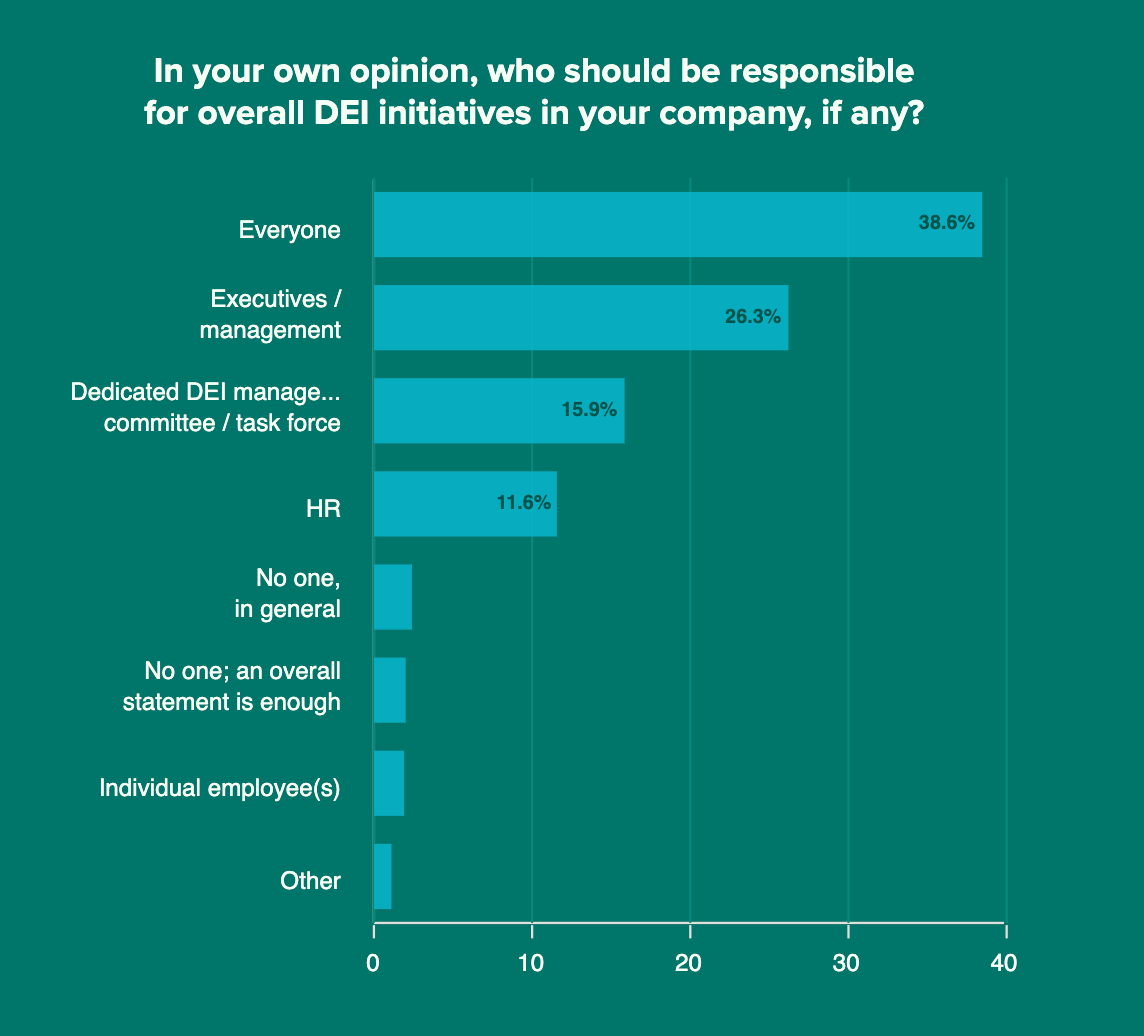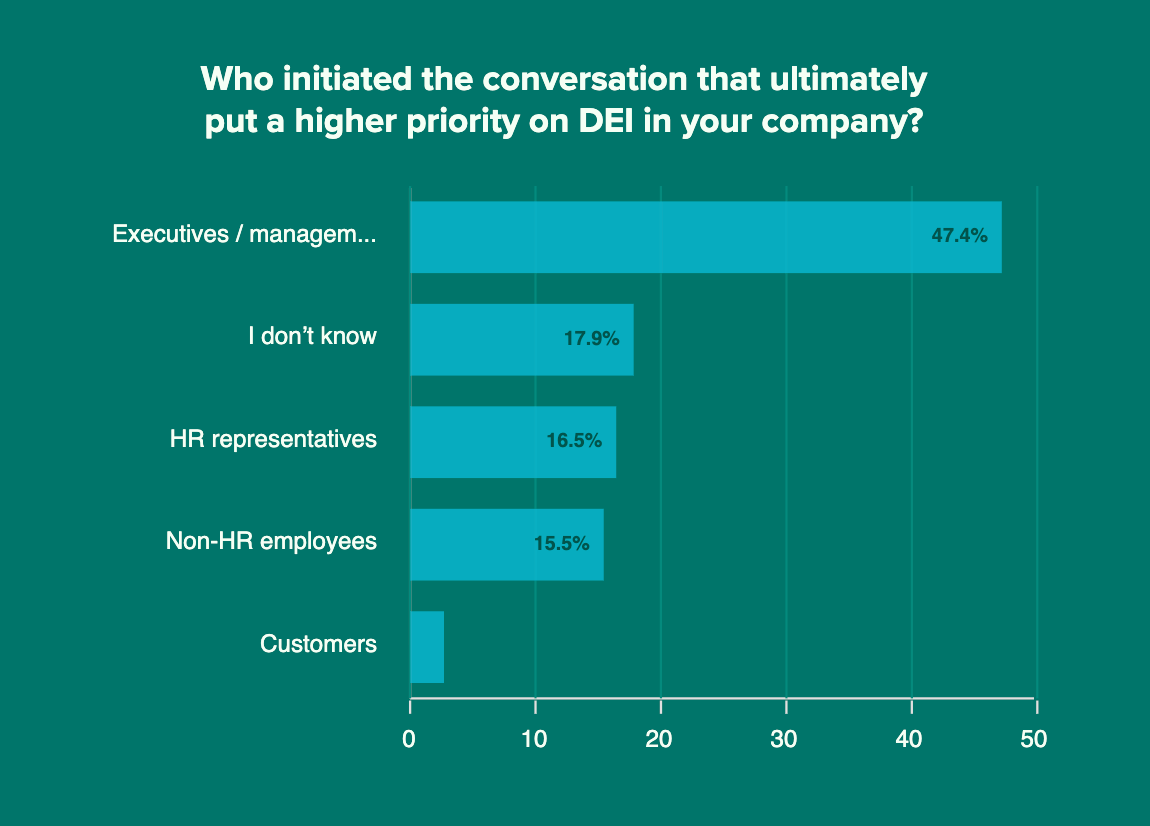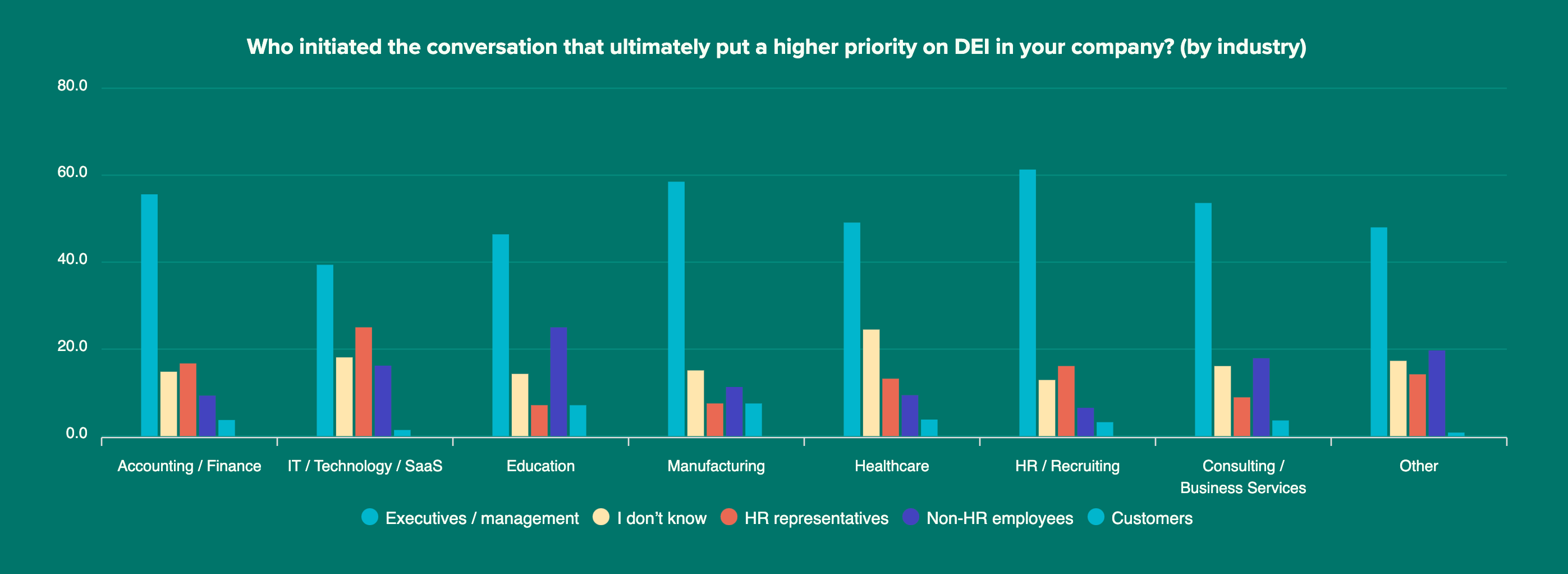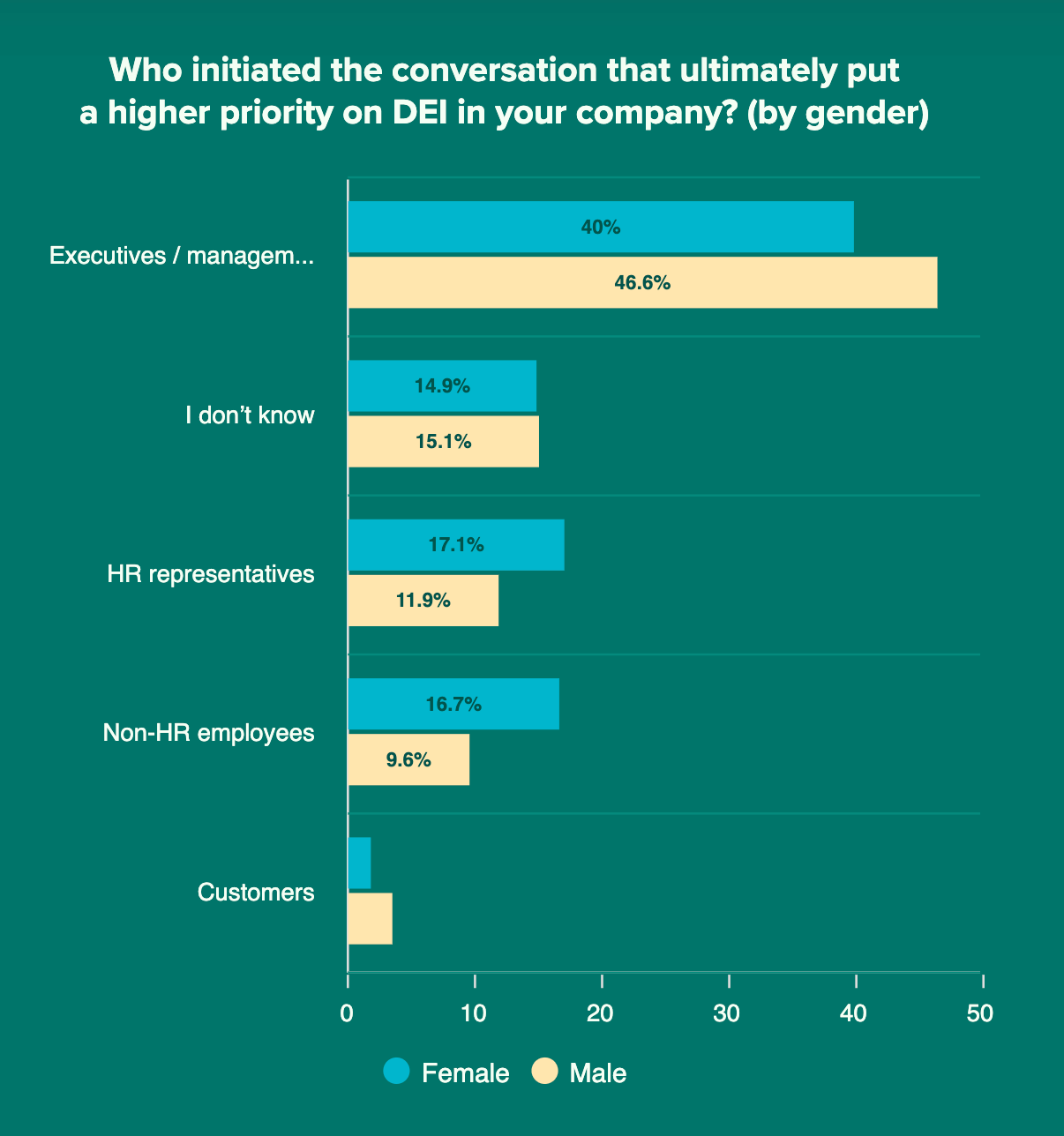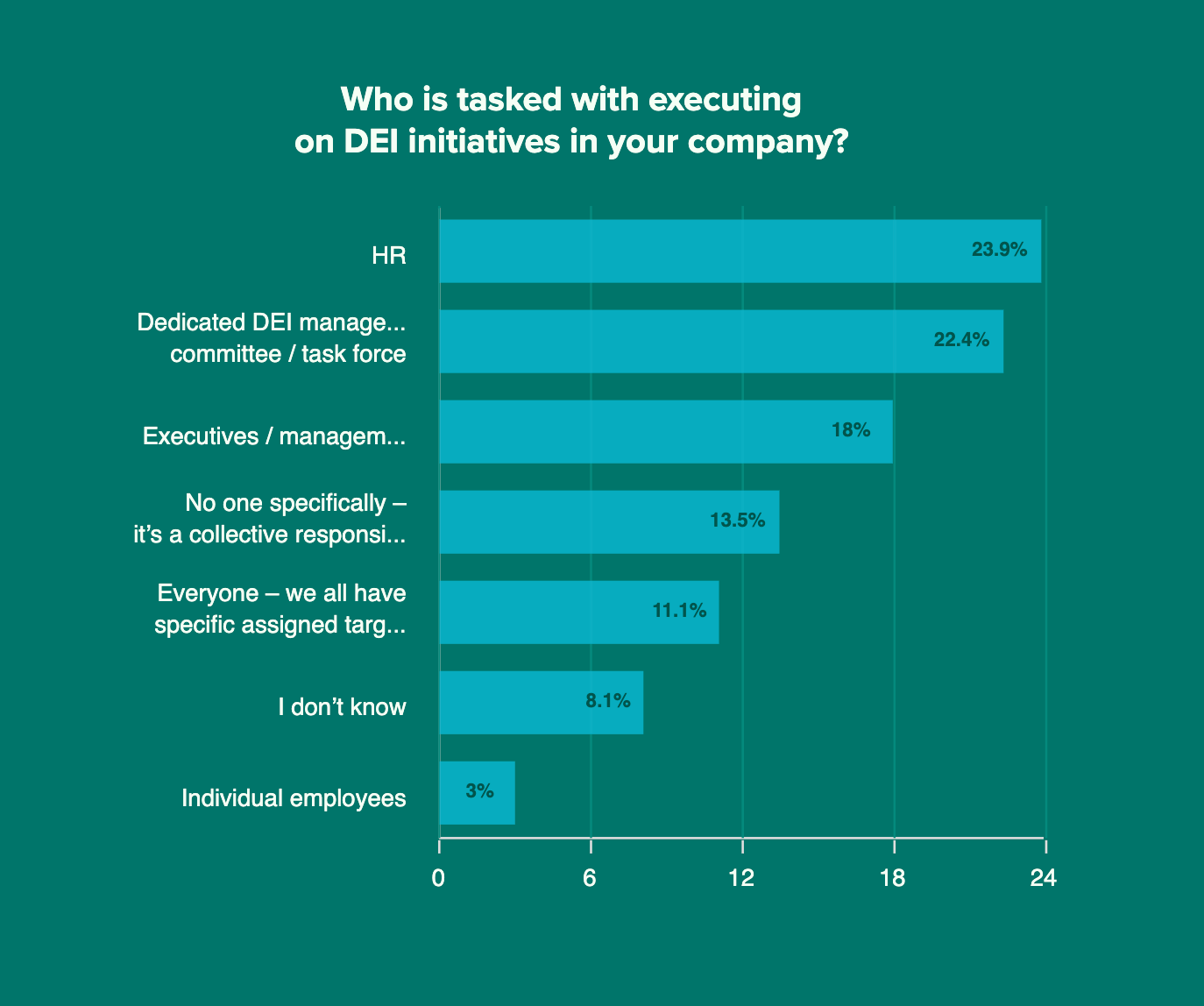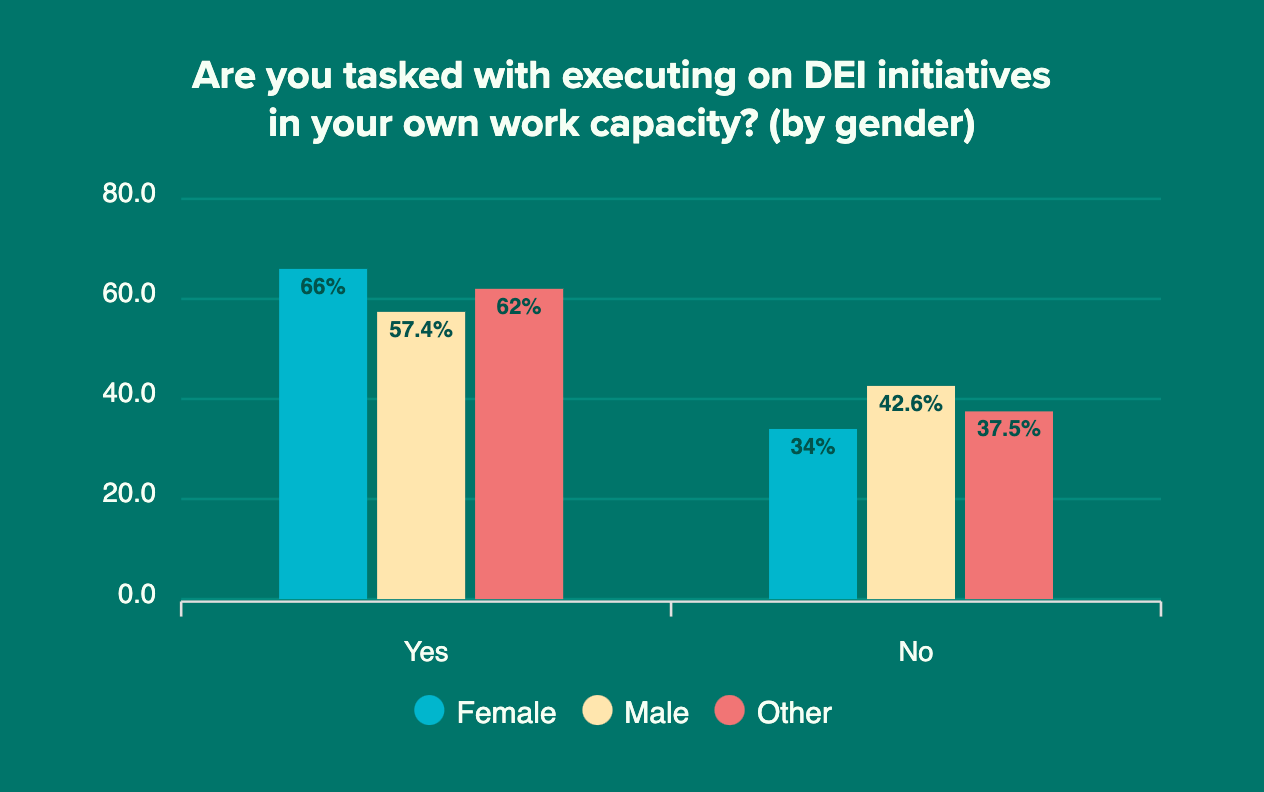DEI leadership – and who’s actually doing the work?
In the realm of Diversity, Equity, and Inclusion (DEI), the work is often shouldered by Human Resources, but also disproportionately by women and minorities. While executives initiate DEI conversations, the responsibility for educating others and implementing initiatives often falls on those at the staff level.

This is the fourth in a series of excerpts from our survey report titled All roads lead to diversity, equity & inclusion in the workplace. But which one do you take?, which was published in January 2021. Nearly 800 business and HR professionals filled out the 30-question survey, resulting in numerous compelling insights both for business and recruitment interests.
While there is overwhelming support for DEI, and “everyone” is responsible in some shape or form, executives clearly bear the brunt of individual responsibility in DEI leadership – especially according to those in entry-level or individual contributor positions. The burden of DEI work also seems to fall disproportionately on women and minorities.
In this chapter, we address the following questions:
- Who is responsible for DEI leadership in the workplace?
- Who started the conversation on DEI at work?
- Who is actually doing the work in DEI?
So… who should be responsible for DEI?
Those at the executive or director / manager level are less likely to say that those at their own job level should take on DEI leadership at 22%, compared with 28.8% of those in entry-level or individual contributor positions.
Those in higher-level positions (18.9%) are also more likely than those in entry-level or individual contributor positions (14.3%) to say that a dedicated DEI manager / committee / task force should be responsible for general DEI leadership in their company.
When looking at overall responses, while two out of five respondents (38.6%) say that everyone is responsible for seeing increased diversity, equity and inclusion in their organization, 26.3% say that executives and management should be responsible. Another 15.9% say it should be led by a dedicated DEI committee, DEI task force or DEI manager.
There are two ways to look at this: first, it could be the tendency to say, yes, it needs to happen, but the actual work should be owned by someone else, or it could be that employees are looking to their leaders to set direction and define the culture of the company.
Ultimately, though, when looking at the very low numbers of those who say no one should be responsible, it’s safe to suggest that our respondents wholly believe we’re in it together and that someone should absolutely take ownership of initiatives to ensure DEI progress. However, we shouldn’t ignore that striking discrepancy between higher-level responses and staff-level responses in terms of DEI leadership.
Who started the conversation on DEI?
Our data clearly shows that the call for greater DEI throughout an organization is being acknowledged at the decision-making level, with formal action items being established in many cases. As for who started that conversation on DEI in the first place, 47.4% of respondents say executives and management initiated it, compared with 15.5% who say it was non-HR employees who prompted that conversation.
When breaking down the numbers by industry, there are differences. We found that 58.5% of those in Manufacturing and 61.3% of those in HR / Recruiting say executives and management ultimately started that conversation – significantly higher than the 47.4% of all respondents who responded the same as stated above.
Of those in IT / Technology / SaaS, 25% say HR representatives initiated the conversation, compared with 16.5% overall, while one quarter (24.5%) of those in Healthcare say they didn’t know, compared with 17.9% overall. Education (7.1%) and Manufacturing (7.5%) are more likely to say their customers initiated the conversation, compared with just 2.7% overall.
That is, of course, not to say that customer opinion isn’t important – it is. It’s possible that DEI is viewed through an internal lens (DEI in the employee base) as opposed to a customer-facing lens (DEI in product / service). There are, however, overlaps – the customer-facing component of your workforce can influence buying habits in both positive and negative ways.
Male versus female answers also turn up interesting findings in terms of DEI leadership. Those who identify as male are more likely to say executives and management started the conversation (46% vs. 40%). Those who identify as female are more likely to say that HR representatives (17.1% vs. 16.7% overall) or that non-HR employees (16.7% vs. 9.6% overall) started that conversation.
Who’s actually doing the work in DEI?
Ultimately, when asked who is actually tasked with executing on DEI initiatives, nearly one quarter (23.9%) say Human Resources owns that area – compared with 11.6% who say HR should be responsible (as indicated above).
“Our HR [department] drives initiatives, supported by the executive team. [At] the same time, we have an employee resource group that serves as a I&D [inclusion and diversity] committee, which brainstorms / discusses / evaluates ideas monthly. We are also training our managers and relying on them to act upon our goals during hires, promotion cycles, etc.”
We also asked respondents directly if they are tasked with executing on DEI initiatives in their own work capacity. Overall, 61.6% say yes. Again, the numbers differ when breaking that down by gender identity, with 66% of females answering “Yes” compared with 57.4% of males.
Those who identify as a minority in both their work and local communities also disproportionally answered “Yes” at 65.6%, compared with 61.6% overall.
This indicates that the work of informing and educating others on DEI is disproportionately borne by females and minorities.
We hope you find our survey results on DEI at work to be helpful to you both professionally and personally. Any thoughts or questions, please feel free to share them with us via Twitter, LinkedIn, or direct email (with “DEI report” in the subject heading). We want to hear from you!
Check out the other excerpts from our survey report on Diversity, Equity and Inclusion:
1. DEI at work: It’s time to take a deep dive
2. What does DEI mean for you and your business?
3. Is there meaningful progress in DEI? Depends on who you ask
5. Your DEI strategic plan: The road is fraught with hurdles
6. What are your top DEI initiatives for the workplace?
7. Your DEI recruitment strategy: What are your action items?
8. Time for a DEI action plan: We’ll help you get there
Frequently asked questions
- Who is responsible for DEI leadership in the workplace?
- Everyone has a role to play in DEI leadership, but executives bear the most responsibility, especially according to those in entry-level positions. However, the burden of DEI work often falls disproportionately on women and minorities.
- Who started the conversation on DEI at work?
- The conversation on DEI is usually initiated by executives and management, as indicated by 47.4% of respondents. However, non-HR employees also play a significant role in starting these conversations.
- Who is actually doing the work in DEI?
- When it comes to executing DEI initiatives, Human Resources often takes the lead. However, the work of informing and educating others on DEI is disproportionately borne by females and minorities.
- What is the discrepancy between higher-level responses and staff-level responses in terms of DEI leadership?
- Those at the executive or director/manager level are less likely to say that those at their own job level should take on DEI leadership compared to those in entry-level or individual contributor positions. This discrepancy suggests different perceptions of responsibility based on job level.
- How does the industry affect who starts the conversation on DEI?
- The industry can influence who initiates the DEI conversation. For instance, in Manufacturing and HR/Recruiting, executives and management are more likely to start the conversation. In contrast, in IT/Technology/SaaS, HR representatives are more likely to initiate the conversation.

